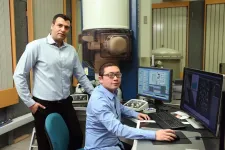(Press-News.org) Reston, Virginia--Physicians who follow artificial intelligence (AI) advice may be considered less liable for medical malpractice than is commonly thought, according to a new study of potential jury candidates in the U.S. Published in the January issue of The Journal of Nuclear Medicine (JNM). The study provides the first data related to physicians' potential liability for using AI in personalized medicine, which can often deviate from standard care.
"New AI tools can assist physicians in treatment recommendations and diagnostics, including the interpretation of medical images," remarked Kevin Tobia, JD, PhD, assistant professor of law at the Georgetown University Law Center, in Washington D.C. "But if physicians rely on AI tools and things go wrong, how likely is a juror to find them legally liable? Many such cases would never reach a jury, but for one that did, the answer depends on the views and testimony of medical experts and the decision making of lay juries. Our study is the first to focus on that last aspect, studying potential jurors' attitudes about physicians who use AI."
To determine potential jurors' judgments of liability, researchers conducted an online study of a representative sample of 2,000 adults in the U.S. Each participant read one of four scenarios in which an AI system provided a drug dosage treatment recommendation to a physician. The scenarios varied the AI recommendation (standard or nonstandard drug dosage) and the physician's decision (to accept or reject the AI recommendation). In all scenarios, the physician's decision subsequently caused harm to the patient.
Study participants then evaluated the physician's decision by assessing whether the treatment decision was one that could have been made by "most physicians" and "a reasonable physician" in similar circumstances. Higher scores indicated greater agreement and, therefore, lower liability.
Results from the study showed that participants used two different factors to evaluate physicians' utilization of medical AI systems: (1) whether the treatment provided was standard and (2) whether the physician followed the AI recommendation. Participants judged physicians who accepted a standard AI recommendation more favorably than those who rejected it. However, if a physician received a nonstandard AI recommendation, he or she was not judged as safer from liability by rejecting it.
While prior literature suggests that laypersons are very averse to AI, this study found that they are, in fact, not strongly opposed to a physician's acceptance of AI medical recommendations. This finding suggests that the threat of a physician's legal liability for accepting AI recommendations may be smaller than is commonly thought.
In an invited perspective on the JNM article, W. Nicholson Price II and colleagues noted, "Liability is likely to influence the behavior of physicians who decide whether to follow AI advice, the hospitals that implement AI tools for physician use and the developers who create those tools in the first place. Tobia et al.'s study should serve as a useful beachhead for further work to inform the potential for integrating AI into medical practice."
In an associated JNM article, the study authors were interviewed by Irène Buvat, PhD, and Ken Herrmann, MD, MBA, both leaders in the nuclear medicine and molecular imaging field. In the interview the authors discussed whether the results of their study might hold true in other countries, if AI could be considered as a type of "medical expert," and the advantages of using AI from a legal perspective, among other topics.
INFORMATION:
This study was made available online in September 2020 ahead of final publication in print in January 2021.
The authors of "When Does Physician Use of AI Increase Liability?" include Kevin Tobia, Georgetown University Law Center, Washington, DC and Eidgenössische Technische Hochschule Zürich Center for Law and Economics, Zürich, Switzerland; and Aileen Nielsen and Alexander Stremitzer, Eidgenössische Technische Hochschule Zürich Center for Law and Economics, Zürich, Switzerland. The information in this press release, research study, and interview is general in nature and should not be construed as legal or professional advice.
The authors of the invited perspective, "How Much Can Potential Jurors Tell Us About Liability for Medical Artificial Intelligence?" include W. Nicholson Price II, University of Michigan Law School, Ann Arbor, MI, and Sara Gerke and I. Glenn Cohen, Harvard Law School, Harvard University, Cambridge, Massachusetts.
The interviewers in "Discussion with Leaders: Buvat and Herrmann Talk with Stremitzer, Tobia and Nielsen" include Irène Buvat, PhD, Centre National de la Recherche Scientifique (CNRS), Inserm Laboratory of Translational Imaging in Oncology, Institut Curie, Orsay, France, and Ken Herrmann, MD, MBA, Department of Nuclear Medicine, Universitätsklinikum Essen, Essen, Germany.
Please visit the SNMMI Media Center for more information about molecular imaging and precision imaging. To schedule an interview with the researchers, please contact Rebecca Maxey at (703) 652-6772 or rmaxey@snmmi.org.
About the Society of Nuclear Medicine and Molecular Imaging
The Journal of Nuclear Medicine (JNM) is the world's leading nuclear medicine, molecular imaging and theranostics journal, accessed close to 10 million times each year by practitioners around the globe, providing them with the information they need to advance this rapidly expanding field. Current and past issues of The Journal of Nuclear Medicine can be found online at http://jnm.snmjournals.org.
JNM is published by the Society of Nuclear Medicine and Molecular Imaging (SNMMI), an international scientific and medical organization dedicated to advancing nuclear medicine and molecular imaging--precision medicine that allows diagnosis and treatment to be tailored to individual patients in order to achieve the best possible outcomes. For more information, visit http://www.snmmi.org.
TORONTO, ON - New research led by researchers at the University of Toronto (U of T) and Northwestern University employs machine learning to craft the best building blocks in the assembly of framework materials for use in a targeted application.
The findings, published today in Nature Machine Intelligence, demonstrated that the use of artificial intelligence (AI) approaches can help in proposing novel materials for diverse applications. One example is the separation of carbon dioxide from industrial combustion processes. AI approaches promise the acceleration of the design cycle for materials.
With the objective of improving the separation of chemicals in industrial processes, the team of researchers - including collaborators from ...
'This effort truly represents a "moonshot" in COVID-19 research'
Scientists identify target to treat COVID pneumonia and reduce severity
Clinical trials with new experimental drug to begin early in 2021
Goal is to develop treatments that make COVID-19 no worse than a common cold
First comparison between immune mechanisms driving COVID-19 pneumonia with other pneumonias
CHICAGO --- Bacteria or viruses like influenza that cause pneumonia can spread across large regions of the lung over the course of hours. In the modern intensive care unit, these bacteria or viruses are usually controlled either by antibiotics or by the body's immune system within ...
How are networks of neurons connected to make functional circuits? This has been a long standing question in neuroscience. To answer this fundamental question, researchers from Boston Children's Hospital and Harvard Medical School developed a new way to study these circuits and in the process learn more about the connections between them.
"Neural networks are extensive, but the connections between them are really small," says Wei-Chung Allen Lee, PhD, of the F.M. Kirby Neurobiology Center at Boston Children's and Harvard Medical School. "So, we have had to develop techniques to see them in extremely high-resolution over really large areas and volumes." ...
ORLANDO, Jan. 11, 2021 - Data from Arecibo Observatory in Puerto Rico has been used to help detect the first possible hints of low-frequency disturbances in the curvature of space-time.
The results were presented today at the 237th meeting of the American Astronomical Society, which was held virtually, and are published in The Astrophysical Journal Letters. Arecibo Observatory is managed by the University of Central Florida for the National Science Foundation under a cooperative agreement.
The disturbances are known as gravitational waves, which ripple through space as a result of the movement of incredibly massive objects, such as black holes orbiting one another or the collision of neutron stars.
It's important to understand these waves as they provide insight into the history ...
CAMBRIDGE, MA -- When we experience a new event, our brain records a memory of not only what happened, but also the context, including the time and location of the event. A new study from MIT neuroscientists sheds light on how the timing of a memory is encoded in the hippocampus, and suggests that time and space are encoded separately.
In a study of mice, the researchers identified a hippocampal circuit that the animals used to store information about the timing of when they should turn left or right in a maze. When this circuit was blocked, the mice were unable to remember which way they were supposed to turn next. However, disrupting the circuit ...
North Carolina State University-led researchers have developed an analytical measurement "framework" which could allow organic solar cell researchers and manufacturers to determine which materials will produce the most stable solar cells prior to manufacture.
Organic solar cells have increased in efficiency over the past decades, but researchers and manufacturers still struggle with determining which material combinations work best and why, as well as with achieving stable morphology and operation.
"There is still a lot of 'trial and error' guesswork involved in identifying promising materials for these solar cells," says Harald Ade, Goodnight Innovation Distinguished Professor of Physics at NC State and co-corresponding author of the research. ...
Two studies in today's Nature Neuroscience, led by researchers at Boston Children's Hospital, Brigham and Women's Hospital (BWH), and Harvard Medical School (HMS), implicate mosaic mutations arising during embryonic development as a cause of autism spectrum disorder (ASD). The findings open new areas for exploring the genetics of ASD and could eventually inform diagnostic testing.
Mosaic mutations affect only a portion of a person's cells. Rather than being inherited, they arise as a "mistake" introduced when a stem cell divides. A mutation in a stem cell will only be passed to the cells that descend from it, producing the mosaic pattern. ...
Reza Shahbazian-Yassar, professor of mechanical and industrial engineering at the University of Illinois Chicago.
Shahbazian-Yassar and colleagues facilitated the development of a cutting edge "Swiss Army knife" catalyst made up of 10 different elements - each of which on its own has the ability to reduce the combustion temperature of methane - plus oxygen. This unique catalyst can bring the combustion temperature of methane down by about half - from above 1400 degrees Kelvin down to 600 to 700 degrees Kelvin.
Their findings are reported in the journal Nature Catalysis.
In previously-published research, ...
Tales of post-apocalyptic landscapes in which few survivors emerge into a new and much different world have long been popular tales woven by screenwriters and authors. While many enjoy these stories, thinking of them as nothing but a guilty pleasure, they may not realize that immersing themselves in fiction has prepared them for the reality of 2020, according to a team of researchers.
John Johnson, professor emeritus of psychology at Penn State, recently conducted research with several colleagues revealing that an individual's enjoyment of horror films could have better prepared them for the COVID-19 pandemic as opposed to others who do not enjoy frightening entertainment. Their findings are documented in Personality and Individual Differences.
"My latest ...
The first-ever study of the levels of the stress hormone cortisol in the saliva of newborn white-tailed deer fawns yielded thought-provoking results that have Penn State researchers suggesting predation is not the only thing in the wild killing fawns.
"We think the hormone offers a way to evaluate factors in the environment that affect fawns, such as disease, but are difficult to evaluate when just looking at a carcass that has been picked over by predators," said researcher Duane Diefenbach, adjunct professor of wildlife ecology. "By then, it's impossible to be certain what ...



